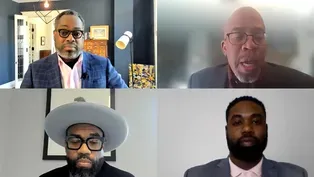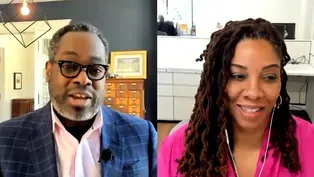
Closing the racial equity gap in real estate development
Clip: Season 51 Episode 12 | 10m 38sVideo has Closed Captions
Organizations offer finances, resources to Black real estate developers in Detroit.
Aspiring African American real estate developers face barriers to entry at every turn. Some local and national organizations are trying to remove those barriers and reduce the racial equity gap that’s currently present in real estate development. Stephen Henderson learns about the financial and mentoring support that's available, and the current development needs in the city's neighborhoods.
Problems with Closed Captions? Closed Captioning Feedback
Problems with Closed Captions? Closed Captioning Feedback
American Black Journal is a local public television program presented by Detroit PBS

Closing the racial equity gap in real estate development
Clip: Season 51 Episode 12 | 10m 38sVideo has Closed Captions
Aspiring African American real estate developers face barriers to entry at every turn. Some local and national organizations are trying to remove those barriers and reduce the racial equity gap that’s currently present in real estate development. Stephen Henderson learns about the financial and mentoring support that's available, and the current development needs in the city's neighborhoods.
Problems with Closed Captions? Closed Captioning Feedback
How to Watch American Black Journal
American Black Journal is available to stream on pbs.org and the free PBS App, available on iPhone, Apple TV, Android TV, Android smartphones, Amazon Fire TV, Amazon Fire Tablet, Roku, Samsung Smart TV, and Vizio.
Providing Support for PBS.org
Learn Moreabout PBS online sponsorship- So I'm gonna start with each of you kind of describing how your organizations support developers of color.
Keona, I'll start with you.
- Absolutely.
So thank you for that.
Invest Detroit is a community development financial institution or CDFI as it is commonly called.
And it really focuses on a mission base.
And our mission is increasing access to capital for people of color, for immigrants, for women, for the reenter, the community of reentering citizens.
And we do that in multiple ways.
Rod already mentioned the Ebiara Fund, which is a partnership between Urge Development, Invest Detroit, and Kresge Foundation, where we launched the developer fund for quasi equity, if you will, into development firms.
But our traditional funding sources also are really focused on increasing that access to capital.
And lowering the barriers for black and brown developers and developers across the city in ways that may be able to structuring such that there is a more accessible financing is less costly.
And then in fact, we're also working with some women professionals, real estate professionals, on creating a fund specifically for women developers in the city of Detroit that is intended certainly to grow.
And so more to come there.
But our real focus is just that, increasing access to capital for the community.
- And look, I mean, I know about investor trade, lots of people in the media, and in the development community understand how that works.
But talk about how, I guess, ground level this work is.
I mean, in a lot of cases you guys are stepping in to help developers bridge gaps, financing gaps.
And the projects that they're doing, they don't have enough to get done.
And you identify the sources.
- Absolutely.
So if we think about the state of our city and the multi-decades of disinvestment, right?
Values are, in a lot of cases, especially in the strategic neighborhoods.
Which is an initiative that we have with a Public-Philanthropic Partnership, the three P's, in the city of Detroit and corporations to really focus on those neighborhoods where there's strong bones, but there is that disinvestment in trying to rejuvenate the neighborhood.
Rod and both Jason and Richard are all developers in one of those communities.
But thinking about those areas where there is a gap.
A gap that can't be serviced by way of debt.
A gap that can't really be funded by way of an equity, whether it's investment equity, whether it's friends and family or someone's individual equity.
And so the strategic neighborhood fund is a way to fill that non-serviceable gap in those neighborhoods.
And we've raised, you know, over 50 million dollars to be supportive of that.
And hopefully we'll go out and raise some more in partnership with the city, such as we can continue that activity that sparks investments, sparks activity.
And then helps to grow and build those commercial corridors along with the neighborhoods behind the commercial, excuse me, behind the corridor such that we start to have stronger neighborhoods.
- Kenyetta, you're next.
Tell us about the work you're doing to support developers of color.
- DGC we do serve as a nonprofit private entity, and we serve as the primary and the lead economic development agency for the city of Detroit.
And that includes, our mission is to really drive investment and job creation in the city of Detroit.
And we do that through a number of ways through business attraction, business development.
But we're also very in tune to the real estate market and making sure that we keep a lens toward focusing on helping minority developers.
And we do that in a number of ways.
We do that through transaction structuring, deal structuring, and transaction management.
We provide financing through seller financing as well as we will provide sub-debt to developers projects.
We're also helping the minority developers with strategy and research around the market.
Because a lot of times developers do come into the market or they're already in the market, but they don't have a good preview on the mechanics of the market.
They know they wanna do development, but they don't understand the market.
So we're helping those developers understand the market understand, you know, the returns that they can potentially get in certain areas, because it's different from sub-market to sub-market.
And so we help 'em with that.
And we're also helping developers to really understand the landscape of incentives, and resources that are necessary to create viable projects.
When you have majority developers they oftentimes have the ability or capacity to hire people to go, you know, track down incentives and track down the tools at the state level, the local level.
Our small black developers do not have that kind of access.
They have a problem with access to capital, and they have a problem with access to capital for operations.
So they don't have people to be able to go and do that.
And so we do serve as that umbrella organization to really help facilitate the local and state and federal incentive.
- Yeah.
So Kenyetta, I want to have you also talk about the landscape here in Detroit, and what the progress looks like for developers of color and women.
And what some of the, what some of the barriers that we still need to really kind of smash down so that we can get more people opportunity.
- Yeah, I think those before me have kind of illustrated a lot of the barriers.
And I'm gonna continue to beat the drum.
The lack of meaningful access to capital is one of the issues and the primary issues, and it's a trickle down effect, right?
When you don't have access to capital, and I think Ms. Mays mentioned, the lack of a balance sheet.
We don't come, a lot of the black developers, don't come from generational wealth.
So they don't have these balance sheets that your majority developers have.
And that impedes their ability to get access to meaningful capital.
I think another issue that is really prevalent is the lack of access to premier development sites.
Oftentimes our brown and black developers are developing in the neighborhoods, and that's what we want.
We want them to represent the neighborhoods that they come from.
But like I said, the risk profile and the reward profile is a little different from developing a property in the neighborhood as it would be to- As it would be to develop in a property in your downtown.
So they oftentimes don't have access to the premier development sites that generate the greater returns.
- Jeff, I wanna have you talk about Capital Impact Partners.
And I think you're kind of uniquely situated among our guests today to talk about more of a national picture with this issue.
But also how that national picture relates to Detroit, because I know you guys do work here as well.
- Thank you Stephen.
And thank you for the opportunity.
We're Capital Impact Partners.
We're a national CDFI capital Community Development Financial Institution.
And while we are a national entity working with what we call underestimated communities nationwide, we've actually just celebrated our 10th anniversary of working in Detroit, the Highland Park communities.
We are partners with many of the people that you see on your screen.
So we are committed to Detroit.
And what you've heard in terms of the challenges of developers rising in this space is a national theme as well.
So while it's not specific to the Detroit market or region it definitely plays out similarly, but differently in ways as well.
As a capital provider we're a lender, but we're also a capital provider in other ways.
Talking about the growth of developers, there's the access to capital, there's the access to resources, there's the access to networks that you've heard about.
We as, what we like to tell the story of our work in Detroit is that we've realized that we've been a lender in many important impactful projects in Detroit.
But we realized back mid-twenties, that by and large we weren't making to the developers of color, the black and brown developers, and credit to my colleagues who run our local programming.
They actually created our equitable development initiative.
So it started in Detroit.
So we're very thankful and proud of that story.
And just to say what that is, the Equitable Development Initiative, is really a holistic way to support the growth of black and brown developers in this space.
You've heard many of the barriers in terms of the access or the lack of access to capital.
We work to help demystify in some ways some of those barriers through what we call our learning series.
Where we've worked in many of the- My co-panelists here have been supporters of our programming as lecturers and advisors and jurors to help create an understanding for developers about what does it mean to develop impactful resources, housing, community, facilities, commercial space in the Detroit communities.
What it's led to is many opportunities not only for understanding the capital space, but what does it actually take to not only be a developer but to be an entrepreneur, a small business, if you will.
To understand that long lead time that it takes that you've heard in these conversations to not only vision that project, but vision your enterprise.
Vision what is it that you want to have happen in your community?
Many of the developers we work with, they grow from small fourplexes that you've heard to large scale mixed use developments that we've been very pleased and blessed to support.
- And if you wanna see the entire hour long town hall
The barriers to entry for Black real estate developers
Video has Closed Captions
Clip: S51 Ep12 | 8m 53s | Black real estate developers discuss the barriers to entry in the real estate industry. (8m 53s)
The challenges Black women face in real estate development
Video has Closed Captions
Clip: S51 Ep12 | 3m 53s | Develop Detroit’s Sonya Mays on the barriers Black women face in real estate development. (3m 53s)
Providing Support for PBS.org
Learn Moreabout PBS online sponsorshipSupport for PBS provided by:
American Black Journal is a local public television program presented by Detroit PBS













